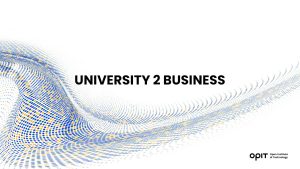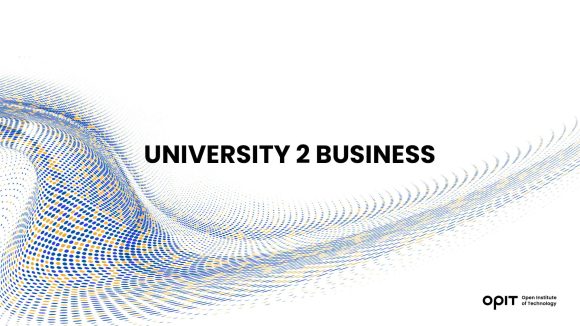

It’s not uncommon to hear stories from people who have committed several years to obtaining a university degree, only to discover it doesn’t fit the purposes they need when entering the business world.
Why? Even though universities spend years developing their degree courses in areas such as economics, business, and biomedical science, it is challenging to keep up with the latest technological advancements due to the lengthy approval process and a lack of experts on staff.
Today, artificial intelligence (AI), big data, cloud computing, and cybersecurity are beginning to impact every aspect of our business lives, regardless of whether you work in a cutting-edge science lab or an antiquities museum. However, many graduates fail to leverage this new technology and adapt it to their careers.
This is why OPIT – the Open Institute of Technology – was born, to offer affordable and accessible courses that bridge the gap between what is taught in traditional universities and what the job market requires.
How Is the Job Market Changing?
According to the World Economic Forum’s Future of Jobs Report 2025, 92 million jobs will be displaced by new technologies, though 170 million new jobs will be created that utilize new technology.
The report suggests that 39% of the key skills required in the job market will change by 2030. These include hard technical skills and the soft skills needed to work in creative environments where change is a constant.
New job descriptions will look for big data specialists, fintech engineers, and AI and machine learning specialists. Additionally, employers will also be seeking creative thinkers who are flexible and agile, as well as resilient in the face of change.
Technology-focused jobs that are in increasing demand include:
- Machine Learning Engineer – Developing and refining algorithms that enable systems to learn from data and improve performance.
- Natural Language Processing Specialist – Developing chatbots that can understand users, communicate naturally, and provide valuable assistance.
- AI Ethicist – Ensuring that AI is developed and deployed with broader social, legal, and moral implications considered.
- Data Architect – Gathering raw data from different sources and designing infrastructure that consolidates this information and makes it usable.
- Chief Data Officer – Leading a company’s data collection and application strategy, ensuring data-driven decision-makers.
- Cybersecurity Engineer – Building information security systems and IT architecture, and protecting them from unauthorized access and cyberattacks.
Over the next few years, we can expect most jobs to require an understanding of the applications for cutting-edge technology, if not how to manage the technical backend. Leaders need to know how to implement AI and automation to save time and reduce errors. Researchers need to understand how to leverage data to reveal new findings, and everyone needs to understand how to work in secure digital environments.
The conclusion is that in tomorrow’s job market, workers will need to find the right balance of technical and human skills to thrive.
A New Approach to Learning Is Needed
Learning requires a fundamental change. Just as businesses need to be adaptable, places of higher learning need to be more adaptable too, keeping their offerings up-to-date and reducing the timescales required to accredit and deliver new courses fit for the current job market.
This aligns with OPIT’s mission to unlock progress and employment on a global scale by providing high-quality and affordable education in the field of technology.
How Does OPIT Work?
OPIT is accredited with the MFHEA (Malta Further and Higher Education Authority) in accordance with the European Qualifications Framework (EQF).
Working with an evolving faculty of experts, OPIT offers a technological education aligned with the current and future career market.
Currently, OPIT offers two Bachelor’s degrees:
- Digital Business – Focuses on merging business acumen with digital fluency, bridging the strategy-execution gap in the evolving digital age.
- Modern Computer Science – Establishes 360-degree foundation skills, both theoretical and applicative, in all aspects of today’s computer science. It includes programming, software development, the cloud, cybersecurity, data science, and AI.
OPIT also offers four Master’s degrees:
- Digital Business & Innovation – Empowers professionals to drive innovation by leveraging digital technologies and AI, covering topics such as strategy, digital marketing, customer value management, and AI applications.
- Responsible Artificial Intelligence – Combines technical expertise with a focus on the ethical implications of modern AI, including sustainability and environmental impact.
- Enterprise Cybersecurity – Integrates technical and managerial expertise, equipping students with the skills to implement security solutions and lead cybersecurity initiatives.
- Applied Data Science & AI – Focuses on the intersection between management and tech with no computer science prerequisites. It provides foundation applicative courses coupled with real-world business problems approached with data science and AI.
Courses offer flexible online learning, with both live online-native classes and recorded catch-up sessions. Every course is hands-on and career-aligned, preparing students for multiple career options while working with top professionals.
Current faculty members include Zorina Alliata, principal AI strategist at Amazon; Sylvester Kaczmarek, AI mentor and researcher at NASA; Andrea Gozzi, head of Strategy and Partnership for the Digital Industries Ecosystem at Siemens; and Raj Dasgupta, AI and machine learning scientist at the U.S. Naval Research Laboratory.
OPIT designs its courses to be accessible and affordable, with a dedicated career services department that offers one-on-one career coaching and advice.
Graduating From OPIT
OPIT recently held its first graduation ceremony for students in 2025. Students described their experience with OPIT as unique, innovative, and inspiring. Share the experience of OPIT’s very first graduates in the video here.
If you are curious to learn more about the OPIT student community, OPIT can connect you with a current student. Just reach out.
Related posts

Source:
- Times of Malta, published on September 18th, 2025
4 min read
The gathering brought together academics and technology leaders from prominent European Institutions, such as Instituto de Empresa (IE University), OPIT itself and the Royal College of Arts, to explore how artificial intelligence is reshaping the university experience.
The OPIT AI Copilot has been trained on the institute’s complete academic archive, a collection created over the past three years that includes 131 courses, more than 3,500 hours of recorded lectures, 7,500 study resources, 320 certified assessments, and thousands of exercises and original learning documents.
Unlike generic AI tools, the Copilot is deeply integrated with OPIT’s learning management system, allowing it to track each student’s progress and provide tailored support.
This integration means the assistant can reference relevant sources within the learning environment, adapt to the student’s stage of study, and ensure that unreleased course content remains inaccessible.
A mobile app is also scheduled for release this autumn, that will allow students to download exercise and access other tools.
During examinations, the Copilot automatically switches to what the institute calls an “anti-cheating mode”, restricting itself to general research support rather than providing direct answers.
For OPIT’s international community of 500 students from nearly 100 countries, many of whom balance studies with full-time work, the ability to access personalised assistance at any time of day is a key advantage.
“Eighty-five per cent of students are already using large language models in some way to study,” said OPIT founder and director Riccardo Ocleppo. “We wanted to go further by creating a solution tailored to our own community, reflecting the real experiences of remote learners and working professionals.”
Tool aims to cut correction time by 30%
The Copilot will also reduce administrative burdens for faculty. It can help grade assignments, generate new educational materials, and create rubrics that allow teachers to cut correction time by as much as 30 per cent.
According to OPIT, this will free up staff to dedicate more time to teaching and direct student engagement.
At the Milan event, Rector Francesco Profumo underlined the broader implications of AI in higher education. “We are in the midst of a deep transformation, where AI is no longer just a tool: it is an environment that radically changes how we learn, teach, and create,” he said.
“But it is not a shortcut. It is a cultural, ethical, and pedagogical challenge, and to meet it we must have the courage to rethink traditional models and build bridges between human and artificial intelligence.”
OPIT was joined on stage by representatives from other leading institutions, including Danielle Barrios O’Neill of the Royal College of Art, who spoke about the role of AI in art and creativity, and Francisco Machin of IE University, who discussed applications in business and management education.
OPIT student Asya Mantovani, also employed at a leading technology and consulting firm in Italy, gave a first-hand account of balancing professional life with online study.
The assistant has been in development for the past eight months, involving a team of OPIT professors, researchers, and engineers.
Ocleppo stressed that OPIT intends to make its AI innovations available beyond its own institution. “We want to put technology at the service of higher education,” he said.
“Our goal is to develop solutions not only for our own students, but also to share with global institutions eager to innovate the learning experience in a future that is approaching very quickly.”

From personalization to productivity: AI at the heart of the educational experience.
Click this link to read and download the e-book.
At its core, teaching is a simple endeavour. The experienced and learned pass on their knowledge and wisdom to new generations. Nothing has changed in that regard. What has changed is how new technologies emerge to facilitate that passing on of knowledge. The printing press, computers, the internet – all have transformed how educators teach and how students learn.
Artificial intelligence (AI) is the next game-changer in the educational space.
Specifically, AI agents have emerged as tools that utilize all of AI’s core strengths, such as data gathering and analysis, pattern identification, and information condensing. Those strengths have been refined, first into simple chatbots capable of providing answers, and now into agents capable of adapting how they learn and adjusting to the environment in which they’re placed. This adaptability, in particular, makes AI agents vital in the educational realm.
The reasons why are simple. AI agents can collect, analyse, and condense massive amounts of educational material across multiple subject areas. More importantly, they can deliver that information to students while observing how the students engage with the material presented. Those observations open the door for tweaks. An AI agent learns alongside their student. Only, the agent’s learning focuses on how it can adapt its delivery to account for a student’s strengths, weaknesses, interests, and existing knowledge.
Think of an AI agent like having a tutor – one who eschews set lesson plans in favour of an adaptive approach designed and tweaked constantly for each specific student.
In this eBook, the Open Institute of Technology (OPIT) will take you on a journey through the world of AI agents as they pertain to education. You will learn what these agents are, how they work, and what they’re capable of achieving in the educational sector. We also explore best practices and key approaches, focusing on how educators can use AI agents to the benefit of their students. Finally, we will discuss other AI tools that both complement and enhance an AI agent’s capabilities, ensuring you deliver the best possible educational experience to your students.
Have questions?
Visit our FAQ page or get in touch with us!
Write us at +39 335 576 0263
Get in touch at hello@opit.com
Talk to one of our Study Advisors
We are international
We can speak in:
